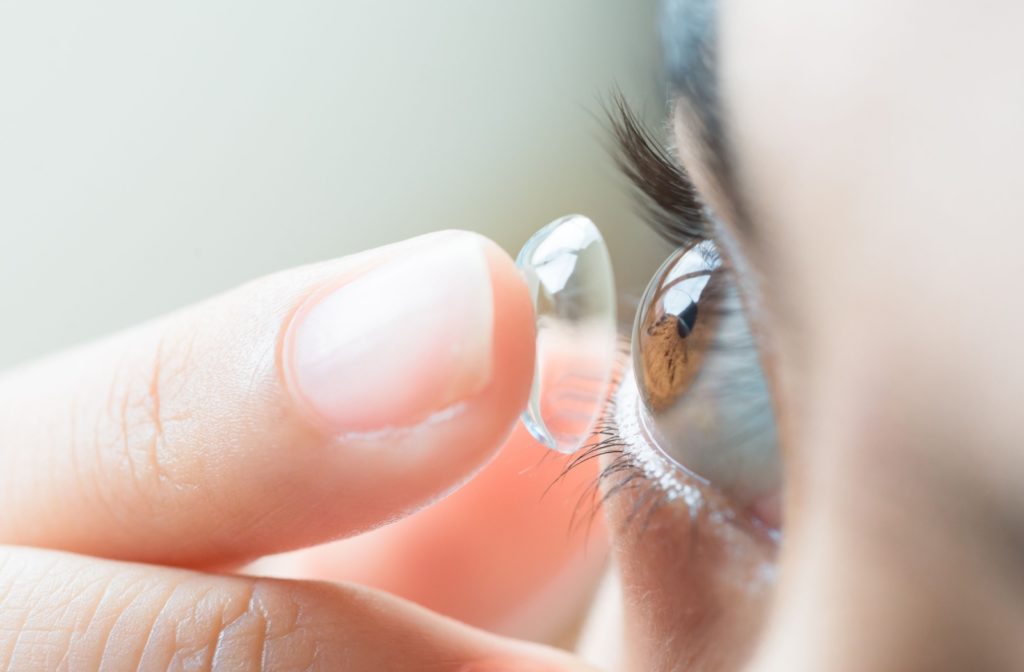Contact lenses are a great alternative to wearing eyeglasses but require slightly more maintenance and care than a conventional pair of glasses. Following proper contact lens wear and care provides several benefits to the wearer including optimal comfort.
As long as your contact lens prescription is up to date, and you’re practicing proper contact lens care and wear, contacts will not make your eyesight worse. In fact, they’re supposed to be making it better with their corrections! But poor contact lens management can increase your risk of infection and lead to further vision complications.
Contact Lenses for Vision Correction
Contact lenses offer temporary vision correction while they are worn. Contacts are thin lenses that are placed on the cornea of the eyes to provide temporary vision correction. They can be used to correct for refractive errors like myopia, hyperopia, astigmatism, and even presbyopia.
As contacts are worn over the cornea of the eyes they don’t cause any permanent changes to the structure or function of your eyes. Once you remove the contact lenses, your eyes return to their natural state.
Annual contact lens examinations are important for contact lens wearers to make sure their contact lens prescription is up-to-date. Your eyes may change over time, and using the same power of contacts may not always produce the right level of vision correction. Make sure you have a recent prescription and that you have the right contact in the right eye!
Since contact lenses sit directly on the cornea, your optometrist will want to make sure that your eyes are healthy enough to continue wearing contacts, that the lenses fit properly, and to monitor any changes in your contact lens prescriptions.
Your optometrist can work with you to determine the most suitable contact lens type based on your refractive error and lifestyle.
The Importance of Replacing Your Contact Lenses
Soft contact lenses are soft, thin, and flexible and are most commonly worn. They include several wear options including daily disposable contacts, reusable bi-weekly contacts, and reusable monthly lenses.
Regardless of which contact lens type you wear, adherence to proper hygiene and usage guidelines is non-negotiable.
Daily disposable contacts are intended for a single day’s use and should be discarded before bed each night. They are not designed to be re-worn. The advantage of daily disposables is that there’s no need for cleaning or storage, minimizing the risk of eye infections.
Replace your contact lens case every three months to help reduce the risk of contamination from any bacteria and debris that may accumulate in your lens case over time. This helps to reduce the risk of eye irritation and infection.
The most common mistake individuals make with their contacts is wearing their lenses for longer than their recommended use. Wearing bi-weekly contacts for longer than 14 days, or monthly lenses for longer than 30 days can increase your risk of eye irritation and infection.

Proper Contact Lens Use & Care
Proper contact lens use and care are important to maintain good eye health, prevent infections, and for comfortable wear. Appropriate contact lens use and wear include:
- Washing Your Hands: Always clean your hands with soap and water before handling contact lenses to prevent transferring dirt, oils, or bacteria to your eyes.
- Following a Replacement Schedule: Adhere to the recommended replacement schedule for your contact lenses, whether they are daily disposables, bi-weekly, or monthly lenses. Using lenses beyond their recommended wear time can increase the risk of eye irritation and infections.
- Clean and Disinfect: Use the appropriate contact lens solution to clean, rinse, and disinfect your lenses. Avoid using water or saliva to clean your lenses, as these can introduce harmful microorganisms to your eyes.
- Proper Lens Storage: Store your contact lenses in a clean lens case filled with fresh contact lens solution. Make sure to replace your lens case every three months to prevent the buildup of debris and bacteria.
- Avoid Sleeping in Lenses: Unless you’re wearing specialized extended-wear contact lenses, avoid sleeping in your contact lenses. Sleeping in lenses can reduce oxygen flow to your eyes and increase the risk of eye infections.
- Avoid Water Exposure: Remove your contact lenses before swimming, showering, or engaging in water activities to prevent exposure to waterborne microorganisms that can cause eye infections.
- Replace Damaged Lenses: If your contact lenses are damaged, creased, torn, or causing discomfort, replace them immediately. Continuing to wear damaged lenses can lead to eye irritation and infections.
- Follow your Doctor’s Recommendations: Follow the instructions and recommendations provided by your optometrist regarding contact lens wear, care, and maintenance specific to your individual needs. If you experience any discomfort, redness, or vision changes while wearing contact lenses, remove them immediately and visit your eye doctor.
Following these guidelines for proper contact lens use and care helps to reduce your risk of eye irritation, infection, and complications.
Complications of Poor Contact Lens Management
Ignoring proper wear and care instructions can lead to several complications, including:
- Dry Eyes: Improper use of contacts can exacerbate symptoms of dry eye syndrome, making lens wear uncomfortable.
- Infections: One of the most serious risks associated with poor contact lens hygiene is the development of eye infections, such as corneal scarring.
- Corneal Ulcers: Also known as keratitis, these painful open sores on the outer layer of the cornea can develop from severe infections and may lead to permanent vision impairment if not treated promptly.
Symptoms to look out for that may suggest irritation from improper contact lens care include:
- Redness
- Watery eyes
- Pain or discomfort
- Blurry vision
- Swelling or discharge
- Itching or burning
If you’re experiencing any symptoms of eye irritation, remove your contact lens immediately and consult your optometrist. Ignoring these symptoms and continuing to wear your contacts can lead to complications and damage to your eyes.
Contact our Team
Contact lenses are a great alternative to wearing eyeglasses for vision correction. As long as your contacts are up-to-date and being cared for correctly: they’ll improve your vision, not worsen it.
Connect with our team at Rancho Santa Margarita Optometry for any questions concerning contact lens care!


